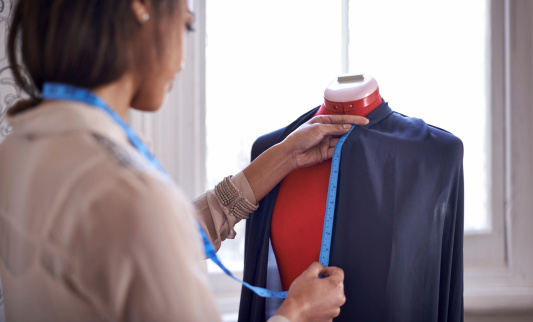
This is the first in the “how to dress for the job you want” series. In this series, I will interview women across various industries that can offer advice on how to look the part for the job. When it comes to work, not all industries are the same and one closet can impress at one firm and fall flat at another.
I am a firm believer in the power of fashion. The way you look will not only be the first impression you make but it can also have a huge impact on how you feel. Both of those are incredibly impactful at a job and at a job interview. I want to make sure you put the best (fashionable) foot forward when you are going after the career you want.
In this edition, I sat down with a good friend and the most fashionable woman I know, Celine Lotmore Jones, and asked her some questions about dressing for a job in the fashion industry. Celine worked for Elie Tahari in New York City as the Senior Manager of Design Development – Accessories and now works in interior design and as the founder of her own line of kaftans (I’m obsessed with them).
Q: What would you say your dress code was at Elie Tahari (casual, business formal, business casual)?
A: The dress code depended on what time of the season it was. If it was market then we had to be business formal and all Elie Tahari, preferably from a current season. If it wasn’t market, then business casual.
Q: OK so interns…. Generally what’s the biggest mistake they make when it comes to dressing at work in a fashion company?
A: I think that the typical thing that interns did was try too hard. They should to have a point of view but not look contrived.
Q: Complete the sentence: If someone comes in wearing [blank] for an interview, you know they won’t get the job
A: There wasn’t really a “rule” about this. If they come in wearing an outfit that is SO far from the brand’s identity that they are interviewing for, that is a problem. You don’t need to be a carbon copy of the brand’s model, but you can’t be WAY off on another tangent either. In the end though, with design, talent is talent so that’s what speaks the loudest. Hopefully the first impression that your outfit gives doesn’t speak louder than your talent.
Q: How about a suit? Is that appropriate for an interview in fashion?
A: To me, if someone came in wearing a suit for a design internship it was off putting. Suits (especially on girls) don’t scream creativity to me. It’s hard to show your individuality and personality in a suit. But that being said, there are no “rules” in fashion, so someone could come in wearing an amazing suit and be too cool for school.
Q: Strange question, but how important is how someone dresses to an interview at a fashion company? Will it affect whether they get the job or not?
A: I think it is very important. If fashion is the industry that you are interested in, your personal style should reflect that fashion is your passion.
Q: Do girls need to wear heels?
A: I don’t think it’s necessary to wear heels. To me it’s about confidence. If heels make you feel confident then wear them, if they make you feel uncomfortable then don’t.
Q: Do you remember any particular hits or misses?
A: I do recall someone once came in for an interview with absolutely no make-up on and wet hair. That bothered me because to me that says “I don’t care enough to make an effort”.
Q: Any particular advice to girls looking to enter the fashion industry on how to dress to make the best impression?
A: As I mentioned previously, let your outfit express your personal style and boost your confidence. It’s a cliché but I think it’s true, when you look good, you feel good. And if you feel good you will perform in an interview better.
Q: Any particular advice for what to highlight on their resumes or cover letters?
A: For the resumes, just try to avoid it looking like you copy and pasted terms and phrases from the internet. Like “great team player, highly motivated”. Those don’t mean much if there is nothing to also express your individuality. Somehow your resume needs to show your personality and individuality. The person reading it needs to learn something about you that will stick in their mind after having read hundreds of resumes. Most importantly, just be you.
This article originally appeared on MOGUL
More from MOGUL:
More Must-Reads from TIME
- Donald Trump Is TIME's 2024 Person of the Year
- Why We Chose Trump as Person of the Year
- Is Intermittent Fasting Good or Bad for You?
- The 100 Must-Read Books of 2024
- The 20 Best Christmas TV Episodes
- Column: If Optimism Feels Ridiculous Now, Try Hope
- The Future of Climate Action Is Trade Policy
- Merle Bombardieri Is Helping People Make the Baby Decision
Contact us at letters@time.com